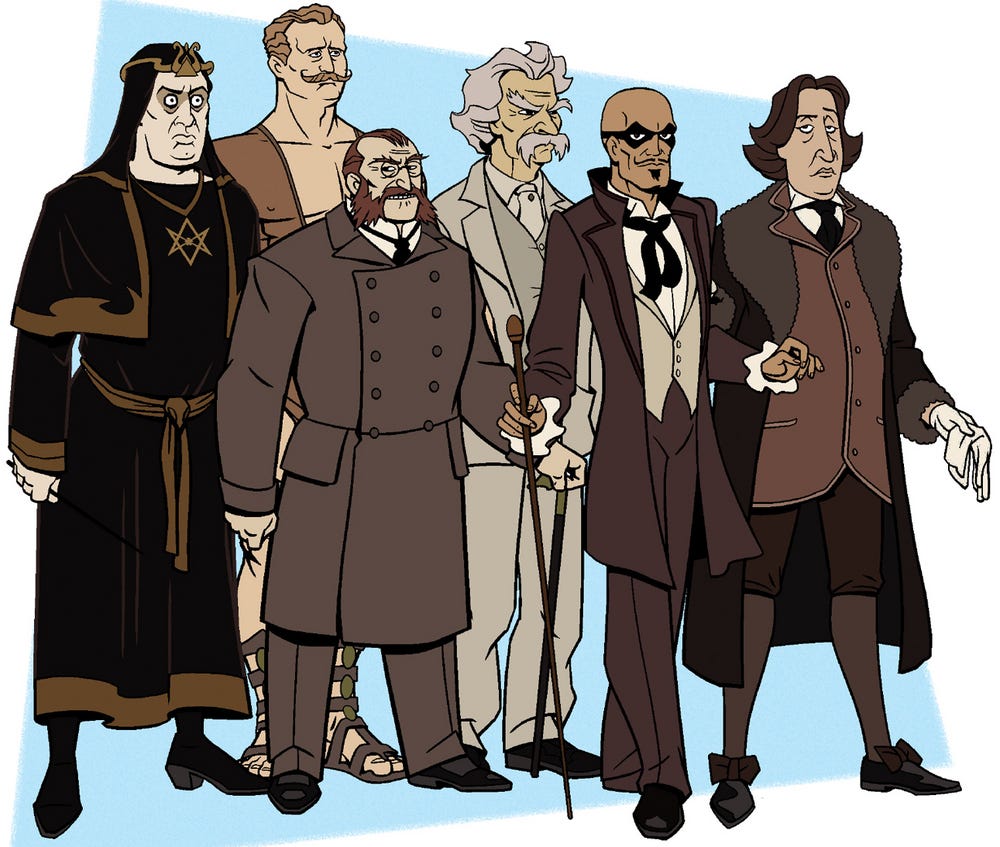First, three quick plugs
Take Me There, the travel-themed anthology from StoryLetter Express, where I placed a fantasy adventure story, recently got enough upvotes to be featured on Reedsy. That book was not a royalty deal, so I have nothing to gain if it sells out, beyond perhaps some editorial goodwill from Winston Malone if he does another one. Still, yay for him.
Also, a tentative acceptance from a magazine to be named later, once the contract goes through. My first reprint!
And our second Spec Fic Fandom game night is happening this evening 6:30-9pm at Gate City Growlers. If you’re local and bored, come on out. It’s better than scrolling TikTok, according to this unreplicated study.
As a bonus, according to the Wikipedia banner, I’m invited to a WicNic in Greenville on Thursday. I feel so special.
Autocracy, Inc.
This book by journalist Anne Applebaum lays out a case that part of the reason that we have so many dictator-type leaders now is that they are supporting one another. Not in a tightly organized way like the Guild of Calamitous Intent from The Venture Bros (the first three seasons of which happen to be on Netflix right now). More like how cancer cells, each pursuing their own selfish agenda, spewing out exosomes like radar chaff to distract and confuse the immune system provide cover for one another, weakening and eventually starving the body.

There is some direct cooperation. Vladimir Putin is the shirtless poster boy for the real-world movement, backed by the governments of China and Iran, selling him weapons and blocking UN Security Council resolutions. The Russians are fairly open about their naked power play (outside their own country, where they control the press).
“This is not about Ukraine at all, but the world order,” said Sergei Lavrov, the Russian foreign minister, soon after the war began. “The current crisis is a fateful, epoch-making moment in modern history. It reflects the battle over what the world order will look like.”
Continuing with the cancer metaphor (which the other side also uses in talking about liberal democracies eroding their “traditional” values),
Everyone assumed that in a more open, interconnected world, democracy and liberal ideas would spread into the autocratic states. Nobody imagined that autocracy and illiberalism would spread to the democratic world instead.
That’s how cancer works. It doesn’t play by the rules, which is an advantage. Applebaum is careful to point out, though, that lax enforcement of said rules is equally responsible.
The deputy mayor of St. Petersburg [Putin] made his money thanks to the Western companies that bought the exports, the Western regulators who were unbothered by the bad contracts, and the Western banks that were strangely lacking in curiosity about the new streams of cash flowing into their accounts.
The price of freedom is eternal vigilance and all that, which as it turns out, was maybe not said by a famous person at all. It may be an emergent example of collective societal myth-making. That doesn’t make it untrue. It does mean that most of us are not truth-seekers. We spend much of our time telling ourselves what we want to hear.
Our old models never acknowledged the truth that many people desire disinformation. They are attracted by conspiracy theories and will not necessarily seek out reliable news at all.
Black Pill
Journalist and Tennessee native Elle Reeve provides an extended example of this dynamic here at home, plumbing the dark corners of the internet and the movements it has enabled, some of which I have written about here before.
Rather than the entire Venn diagram of delusion, she focuses first on Fred Brennan and the chan-based incel cultures, then on the white supremacy movements that have co-opted the incels, leading up to the Unite the Right rally in Charlottesville, which she covered in person. She’ll probably get to Qanon eventually, but I’m only about a hundred pages in at this point.
There are direct connections to the topics of the Applebaum book. From an e-mail by senior racist correspondent Bill Regnery to junior racist correspondent Richard Spencer, pitching a “state sponsored educational campaign” on the part of the Russian government:
such a counter offensive would not just include race but the whole notion of equality and pop culture. it would cast present day american as an ideological empire bent on forcing its cultural imperialism on the rest of the world.
Spencer replied, in part:
we could be useful to the state in spreading pro-Russian and anti-American imperialist propaganda.
It doesn’t take a conspiracy. It just takes a bunch of assholes individually looking for advantage for themselves and their overlapping networks of asshole friends. It’s the very definition of emergence.
On the Brink of Utopia, chapter 4
The Entrepreneurial State
The authors are German. They have a Federal Agency for Disruptive Innovation. In English that would probably be FADS or something equally goofy, but in German they call it SPRIND. They compare themselves to the American Department of Defense’s DARPA, which is not only for military hardware. My boss in Houston, who mostly studied sea slugs at various scales from the molecular to the dissected neural ganglia, had a DARPA grant. The only thing I remember about it at this point is that they wanted quarterly progress reports.
The authors choose DARPA as their most obvious poster child, but they have a larger point to make.
There’s a persistent myth that in the United States, the market, venture capital, and start-up culture are the main drivers of radical innovation. This perception is both widespread outside the United States and an integral part of the United States’ self-image. It’s time to expose this myth to tough questioning. In the United States, with its supposedly radical market orientation, it’s the government that’s making massive targeted investments in innovation in the style of Schumpeter with ambitious goals—and afterward taking an exacting look at the result, at the “return on investment.”
What they’re pushing is not quite the model that an Italian economist Mariana Mazzucato calls “the entrepreneurial state,” where the government that funds breakthroughs remains a shareholder and gets a slice of the profits (on top of the tax revenues they already get). They want to highlight the role of the government as a risk-taker, an agenda-setter, and an evaluator of outcomes.
Locally . . .
North Carolina is the site of one of DARPA’s Regional Commercial Accelerators, focusing on wireless technologies, but we also have a state level funding agency, the NC Collaboratory, run by a geologist named Jeff Warren1 out of UNC Chapel Hill. I got to meet him briefly at the science policy bootcamp a few weeks ago.
Because Warren had worked for Phil Berger in the state Senate, many academics were skeptical of him at best. In “Science for Hyper-Partisan Times,” Warren describes the backlash.
Faculty across the UNC System bristled at the realization the center had been established without their input and even suggested via faculty resolutions that the General Assembly had broken its own laws in doing so.2
Years later, most of them seem to have gotten over that. I hadn’t heard anything about the Collaboratory through academic channels, and so I’m trying to talk my department into inviting him for a seminar.
But back to the book
They have a bunch of piecemeal suggestions for removing bureaucratic obstacles, all of which sound more or less reasonable. Are they necessary changes? Probably not. Are they sufficient changes? Almost certainly not.
The real problem is that we’re dealing with big complex systems full of feedback loops, not small linear systems where cause and effect are easily separable.
So, the real question is: How do we steer a complex system that we don’t understand in the directions that WE THE PEOPLE want it to go?
Not the author and meditator that I have mentioned here on multiple occasions. This one likes bow ties.
I have been watching a similar (and ongoing) mini-rebellion at UNCG, as faculty and students protest budget priorities and program reviews.





and another on corruption in Venezuela, using international connections to steal from the national food program. If it weren't for communicable diseases, I might never learn anything.
https://www.pbs.org/wgbh/frontline/documentary/a-dangerous-assignment-uncovering-corruption-maduro-venezuela/
Watching FRONTLINE episode where AfD supporters wave signs:
"Americans are not our friends! Russians are not our enemies! We Germans are still not free!"
https://www.pbs.org/video/germanys-enemy-within-nhgxas/
In another shot of a more recent indoor AfD campaign event, there's a Smurf balloon floating above the crowd. No idea what that's about.